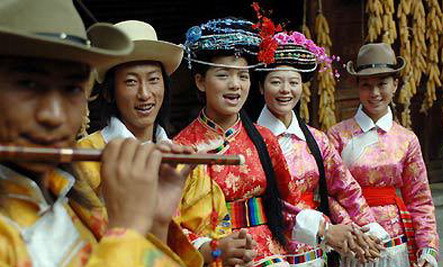Matriarchal tribe's customs in compromise
Wengjici Erqing and Ruheng Cirenduoji grew up in households where grandmothers had absolute authority. Raised by their mothers and their uncles, neither knew his father well.
This unique matrilineal family system followed by the Mosuo people for more than 2,000 years is what the two aspire to protect. But in real life, both chose to compromise their ancient customs to make their modern lives easier.
 In this October 19, 2006 file photo, Mosuo ethnic people perform in Yunnan Nationalities Village in Kunming, capital of southwest China's Yunnan Province. [Xinhua]
In this October 19, 2006 file photo, Mosuo ethnic people perform in Yunnan Nationalities Village in Kunming, capital of southwest China's Yunnan Province. [Xinhua]
Erqing not only sees his wife and his two daughters almost every day but also takes them out occasionally. Duoji married his Mosuo girlfriend and acquired an official marriage certificate.
Almost 15 years after the previously secluded tribe residing in the outlying areas of southwestern China opened their habitats to tourists, the younger generation like Erqing and Duoji have begun to waver between history and modernity, struggling to hold fast to their identity and their rare matriarchal traditions.
With their wood-frame houses scattered around the 60-sq-km Lugu Lake separating Yunnan and Sichuan provinces, the Mosuo ethnic minority has a population of about 40,000. Unlike the majority of China's ethnic groups who follow a strong patrilineal tradition, they have preserved their ancient matriarchal system and the tradition of "walking marriage."
After puberty, a Mosuo girl is free to receive men. But they can only visit at night and must go to their own homes in the morning. Any children born from these relationships are raised by the mother's family. The father will raise his sisters' children.
If either member of such a couple tires of the relationship, they will move on to a new partner.
Fading Custom
Although "walking marriage" remains strong in the Mosuo territory, those who follow the ancient tradition have been declining.
In Luoshui Village of the Ninglang Yi Autonomous County of Lijiang, Yunnan Province, only 60 percent of the people now participate in walking marriages, compared with 70 percent in 1996. Of the remaining 40 percent, half cohabit and half formally marry.
"Poverty is the main driving force. As young people migrated to cities for jobs, cohabitation and marriage cut their living costs. It's strange but true that in villages where people are richer, the tradition is often relatively better preserved," said Erqing.
Duoji admitted that it was difficult to maintain village traditions in town. "My wife now works in Lijiang and we plan to have a child. Without a marriage certificate, our relationship would be illegal there. It might also cause lots of hassle in our future child-raising," he said.
|

